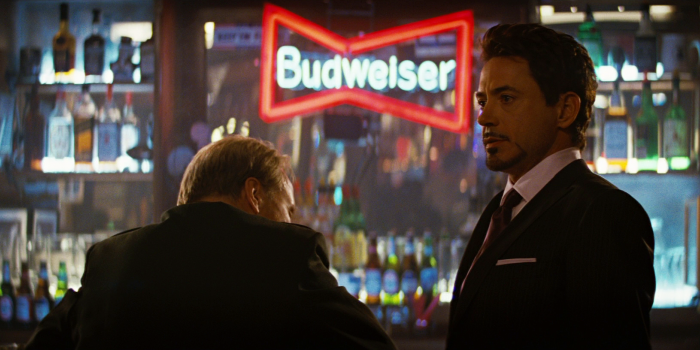
Editor’s Note: this piece contains spoilers for the first season of House of Cards
“Did you think I’d forgotten you?” asks Francis Underwood with a smile as he turns to camera for the first time in the second season of House of Cards, right at the end of the opening episode. After an hour without his direct-to-camera approach we might well have; what’s for sure from the start is that the makers certainly haven’t. This second outing for the series that birthed Netflix’s bold move into original production returns to its world with a wild abandon that seems borne above all on first season feedback. With a deviousness and cunning befitting its whip-turned-veep meta-anti-protagonist, this ingenious immorality play doesn’t so much tie up loose ends in the course of round two as delectably deceive them into entangling themselves.
 Be it precision planning only now paying off—this season, let’s not forget, was commissioned along with the first for a $100 million price tag—or remarkable reverse engineering, the show’s second season instantly sets about doing away with its less interesting aspects. The premiere—can we still use that word with regard to this all-at-once model of distribution?—is nothing if not a showcase for the strength of Beau Willimon’s scripting; he and his team have done it again here, wringing terrific tension from scene after scene of extended conversation. Where previously the show might have seemed a mite scattered in its subplot spread, here every angle—no matter how distant—services the supreme super-story unfolding at the heart of Washington DC.
Be it precision planning only now paying off—this season, let’s not forget, was commissioned along with the first for a $100 million price tag—or remarkable reverse engineering, the show’s second season instantly sets about doing away with its less interesting aspects. The premiere—can we still use that word with regard to this all-at-once model of distribution?—is nothing if not a showcase for the strength of Beau Willimon’s scripting; he and his team have done it again here, wringing terrific tension from scene after scene of extended conversation. Where previously the show might have seemed a mite scattered in its subplot spread, here every angle—no matter how distant—services the supreme super-story unfolding at the heart of Washington DC.
This second outing for the series that birthed Netflix’s bold move into original production returns to its world with a wild abandon that seems borne above all on first season feedback.
That story, not to spoil it, invites the overarching issues that accompanied the first season’s drama to a greater international stage appropriate for Underwood’s elevated position. An increased role for Michael Gill’s hesitant President Walker makes for a generous serving of meaty scenes for Spacey, who is so convincing as an actor playing an actor playing an actor playing his audience. It’s hardly a surprise that the rest of the cast is as much of a joy to behold; Robin Wright leads the pack by miles, but newcomer Molly Parker does well—despite a role written with the leftovers of Peter Russo—as the headstrong newbie in Underwood’s old job. Michael Kelly, maybe, does the most impressive work: his Doug was always a compelling curio; here he’s fleshed out with fixating restraint.
 Each serves exquisitely what the roles require of them to keep the story racing along at a nicely ravenous rate, chomping through twists and turns with a decadence that’s nothing short of delicious to behold. Willimon and co have escalated the stakes suitably this season, and with them upped the ante of awfulness to which Underwood is willing to sink, or indeed rise. Immediately in this batch of episodes we have the character reaching hideous new heights of horrible behaviour to make Walter White quake in his hat. But what’s always been most fascinating about this show, however thrilling its twists, has been observing how Netflix’s data-based commission has restricted or facilitated the storytelling; it’s the ultimate example of commerce versus art. A public penchant for antiheroes, then, has given us the ultimate asshole for whom somehow we’re expected to root.
Each serves exquisitely what the roles require of them to keep the story racing along at a nicely ravenous rate, chomping through twists and turns with a decadence that’s nothing short of delicious to behold. Willimon and co have escalated the stakes suitably this season, and with them upped the ante of awfulness to which Underwood is willing to sink, or indeed rise. Immediately in this batch of episodes we have the character reaching hideous new heights of horrible behaviour to make Walter White quake in his hat. But what’s always been most fascinating about this show, however thrilling its twists, has been observing how Netflix’s data-based commission has restricted or facilitated the storytelling; it’s the ultimate example of commerce versus art. A public penchant for antiheroes, then, has given us the ultimate asshole for whom somehow we’re expected to root.
Willimon and co have escalated the stakes suitably this season, and with them upped the ante of awfulness to which Underwood is willing to sink, or indeed rise.
Or are we? Willimon works well in playing with his obligations, building with Spacey a character so connivingly charming that we can’t but be taken in no matter his transgressions. It’s the idea of his direct-to-us address to challenge our spectatorship, to enquire again and again why we so happily stand by and watch a wicked man whip the world around him. And it’s that tactic, in one late episode of this season, that manages to elicit the very same empathy it’s established to investigate. Spacey, sensitive as he is serpentine, openly agrees with what he imagines is our assessment of him and his deeds. Where Willimon will go with this remains to be seen; what he has on his hands with this unerringly engrossing drama is the means to make powerful comment on how and why we identify with whom.
 Which, really, should be commended as great plotting rather than writing; it’s not just for the knowing quotes here and there that this tale draws ties to Shakespeare, but the Bard might well cringe at some of the dialogue this season has to offer, especially its odd insistence—less an addition than an extension—on Underwood speaking almost exclusively in metaphor. Less grating when spouted by Spacey—who masters his Southern accent to the extent that hearing him speak normally again afterward is unsettling—the lines are emblematic of the show’s tendency toward dramatic grandiosity in all the worst ways. This is a show at its absolute best when skewering politics with primordial playfulness; saddled with showy sentiment it’s a series that shoots itself in the foot with silly self-importance.
Which, really, should be commended as great plotting rather than writing; it’s not just for the knowing quotes here and there that this tale draws ties to Shakespeare, but the Bard might well cringe at some of the dialogue this season has to offer, especially its odd insistence—less an addition than an extension—on Underwood speaking almost exclusively in metaphor. Less grating when spouted by Spacey—who masters his Southern accent to the extent that hearing him speak normally again afterward is unsettling—the lines are emblematic of the show’s tendency toward dramatic grandiosity in all the worst ways. This is a show at its absolute best when skewering politics with primordial playfulness; saddled with showy sentiment it’s a series that shoots itself in the foot with silly self-importance.
Immediately in this batch of episodes we have the character reaching hideous new heights of horrible behaviour to make Walter White quake in his hat.
Perhaps that’s primarily because, let’s be honest, it’s not terribly important: satire is a stretch for a show that equates political conniving with villainy of proportions to make Machiavelli squirm; indeed it’s interesting to ponder on the extent to which the acerbically cynical approach here is dwarfed in its criticisms by the awkwardness-ahoy abandon of Veep. The self-seriousness of grand drama is the greatest threat to House of Cards’ ongoing success; it’s no coincidence that these episodes’ best moments are those of daring despicability, the kind of bold and bleakly comedic Shakespearean gestures that set spoiler-fearing Twitter users fleeing less than an hour after the series debuted. This is a show that might well come to live or die on its ability to realise that it’s us, not the Capitol, about whom it says the most.
 “You know what to do with the cards,” quips a character in the opening episode, an apt sentiment for the sheer prestige with which the entire production—once again—is mounted. If the directorial roster this time around is a little less flashy on the page, it doesn’t show on the screen: returning James Foley leads the pack with six episodes, joining fellow first season helmer Carl Franklin’s two, newcomer—and yet another one-time Spacey collaborator—John Coles’ three, and one apiece from Robin Wright and Jodie Foster. Igor Martinovic assumes DP duties, maintaining the series’ steady interplay of shadows so complimentary to its moral murkiness with a confidence befitting a show well aware it’s one of the most visually resourceful around.
“You know what to do with the cards,” quips a character in the opening episode, an apt sentiment for the sheer prestige with which the entire production—once again—is mounted. If the directorial roster this time around is a little less flashy on the page, it doesn’t show on the screen: returning James Foley leads the pack with six episodes, joining fellow first season helmer Carl Franklin’s two, newcomer—and yet another one-time Spacey collaborator—John Coles’ three, and one apiece from Robin Wright and Jodie Foster. Igor Martinovic assumes DP duties, maintaining the series’ steady interplay of shadows so complimentary to its moral murkiness with a confidence befitting a show well aware it’s one of the most visually resourceful around.
The self-seriousness of grand drama is the greatest threat to House of Cards’ ongoing success; it’s no coincidence that these episodes’ best moments are those of daring despicability, the kind of bold and bleakly comedic Shakespearean gestures that set spoiler-fearing Twitter users fleeing less than an hour after the series debuted.
It’s not only for the aesthetic certainty that this season begins with a shot of Spacey slowly jogging into frame and confidently nodding at the camera. Like it or not, here is a series certain of the weight it brings to bear, capable in the wielding and confident in the outcome. If it tends to overstep—be it in a character who’s one guinea pig away from a Bond villain, or in nodding toward relevant real-world issues on which it really has no insight to offer—it’s only because it’s enjoying itself as much as it expects us to, too. And that, maybe, is where House of Cards‘ art-versus-commerce case study becomes most interesting: its all-at-once release in the age of social media leads to a landscape where spectatorship has become a spoilerphobic race; its meaty, macabre, Machiavelli-meets-Macbeth mastery of storytelling has made that a race we’ll be eagerly awaiting year after year.



